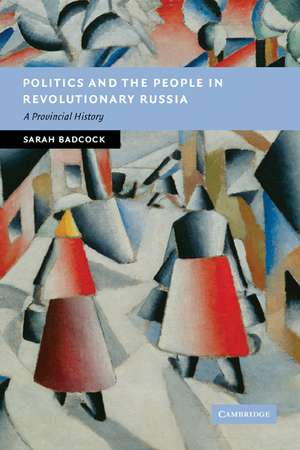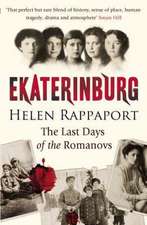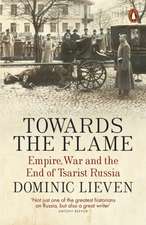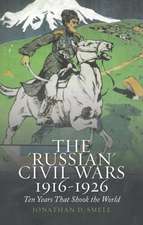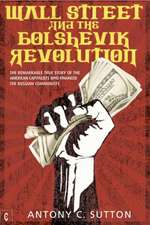Politics and the People in Revolutionary Russia: A Provincial History: New Studies in European History
Autor Sarah Badcocken Limba Engleză Paperback – 16 feb 2011
| Toate formatele și edițiile | Preț | Express |
|---|---|---|
| Paperback (1) | 291.05 lei 6-8 săpt. | |
| Cambridge University Press – 16 feb 2011 | 291.05 lei 6-8 săpt. | |
| Hardback (1) | 695.93 lei 6-8 săpt. | |
| Cambridge University Press – 3 oct 2007 | 695.93 lei 6-8 săpt. |
Din seria New Studies in European History
-
 Preț: 177.91 lei
Preț: 177.91 lei -
 Preț: 238.02 lei
Preț: 238.02 lei -
 Preț: 208.50 lei
Preț: 208.50 lei -
 Preț: 398.42 lei
Preț: 398.42 lei -
 Preț: 237.92 lei
Preț: 237.92 lei - 9%
 Preț: 593.91 lei
Preț: 593.91 lei -
 Preț: 180.06 lei
Preț: 180.06 lei - 9%
 Preț: 592.61 lei
Preț: 592.61 lei -
 Preț: 169.70 lei
Preț: 169.70 lei -
 Preț: 211.13 lei
Preț: 211.13 lei -
 Preț: 166.99 lei
Preț: 166.99 lei -
 Preț: 266.53 lei
Preț: 266.53 lei -
 Preț: 241.90 lei
Preț: 241.90 lei -
 Preț: 429.99 lei
Preț: 429.99 lei -
 Preț: 400.05 lei
Preț: 400.05 lei - 11%
 Preț: 698.50 lei
Preț: 698.50 lei -
 Preț: 275.85 lei
Preț: 275.85 lei -
 Preț: 330.09 lei
Preț: 330.09 lei - 11%
 Preț: 695.93 lei
Preț: 695.93 lei -
 Preț: 423.10 lei
Preț: 423.10 lei -
 Preț: 340.13 lei
Preț: 340.13 lei - 11%
 Preț: 698.30 lei
Preț: 698.30 lei -
 Preț: 326.82 lei
Preț: 326.82 lei -
 Preț: 339.37 lei
Preț: 339.37 lei -
 Preț: 396.59 lei
Preț: 396.59 lei -
 Preț: 383.48 lei
Preț: 383.48 lei -
 Preț: 292.40 lei
Preț: 292.40 lei - 14%
 Preț: 682.94 lei
Preț: 682.94 lei -
 Preț: 282.75 lei
Preț: 282.75 lei -
 Preț: 417.07 lei
Preț: 417.07 lei -
 Preț: 437.18 lei
Preț: 437.18 lei - 14%
 Preț: 873.67 lei
Preț: 873.67 lei -
 Preț: 420.40 lei
Preț: 420.40 lei -
 Preț: 319.99 lei
Preț: 319.99 lei - 14%
 Preț: 687.39 lei
Preț: 687.39 lei -
 Preț: 397.01 lei
Preț: 397.01 lei - 11%
 Preț: 695.93 lei
Preț: 695.93 lei - 11%
 Preț: 543.84 lei
Preț: 543.84 lei
Preț: 291.05 lei
Nou
Puncte Express: 437
Preț estimativ în valută:
55.70€ • 57.94$ • 45.98£
55.70€ • 57.94$ • 45.98£
Carte tipărită la comandă
Livrare economică 14-28 aprilie
Preluare comenzi: 021 569.72.76
Specificații
ISBN-13: 9780521182256
ISBN-10: 0521182255
Pagini: 282
Dimensiuni: 152 x 229 x 15 mm
Greutate: 0.38 kg
Editura: Cambridge University Press
Colecția Cambridge University Press
Seria New Studies in European History
Locul publicării:Cambridge, United Kingdom
ISBN-10: 0521182255
Pagini: 282
Dimensiuni: 152 x 229 x 15 mm
Greutate: 0.38 kg
Editura: Cambridge University Press
Colecția Cambridge University Press
Seria New Studies in European History
Locul publicării:Cambridge, United Kingdom
Cuprins
1. Introduction; 2. The February Revolution: whose story to believe?; 3. The Socialist Revolutionary Party, and the place of party politics; 4. Choosing local leaders; 5. Talking to the people and shaping Revolution; 6. Soldiers and their wives; 7. 'Water is yours, light is yours, the land is yours, the wood is yours'; 8. Feeding Russia; Conclusions; Bibliography.
Recenzii
'This is a significant contribution …' Brian Bonhomme, The American Historical Review
'[Badcock] succeeds wonderfully in showing us the power of locality in the Revolution and making us appreciate why local interests so quickly overwhelmed the stillborn national agendas of the political elite. To her great credit, she has a light touch with her sources. She lets 'ordinary people' speak through their letters and petitions so that we can begin to see what they would have seen - the chaos, the indeterminacy, and the vulnerability as well as the hope and expectation.' Willard Sunderland, The Journal of Modern History
'Sarah Badcock's new and exciting book is a major contribution to the historiography of 1917 … It will be read with great interest by historians of the Revolution and scholars of modern Russia more broadly … a fine addition to graduate-level seminars in Russian history.' Robert H. Greene, Canadian Journal of History
'Sarah Badcock's study of the Revolution offers a detailed and absorbing analysis of political power in the revolutionary setting of 1917.' Lutz Haefner, H-HistGeog
'Badcock's book is a welcome addition to the still relatively small number of studies that have focused on the Russian Revolution outside St Petersburg and Moscow. It also effectively challenges students to rethink the interpretations based on the views of the political elites. It is essential reading for all specialists on the Revolution.' Richard D. King, The Historian
'Taking part in a burgeoning trend on regional history, Sarah Badcock proposes a new history of the Revolution as experienced in the two Volga provinces of Nizhni Novgorod and Kazan. The failure of the eight months of Russia's experiment of democracy is studied in a well informed narrative based on local newspapers and archive materials.' Central Eurasian Reader
'… [Badcock] extensively discusses the way that citizens and local politicians are forced to react to the new conjunctures of power that are present when democratizing reforms are launched in conditions of state failure. She explains very clearly why elections, political parties, local councils, and other key democratic institutions do not fulfill either democratic objectives or meet the needs of broad political communities when political and social life is in drastic turmoil. These are important points, ones of interest well beyond the field of historians of the Russian revolution. I hope that readers interested in these or similar themes will examine this work closely.' Joshua Sanborn, Journal of World History
'Badcock reinforces the prevailing wisdom that the revolutionary process of 1917 led to unbridgeable gulfs between those with power and those without it. Her important contribution is to demonstrate how this process worked from the perspective of the latter group, which had its own logical agendas. Badcock is careful not to stray beyond her carefully assembled evidence. Nonetheless, her book suggests certain interesting continuities with Soviet-era policies that are usually blamed on the Bolsheviks but seem to have grown out of the larger political and social conflict begun in 1917: a hostility to the market but also to forced grain requisitions; an antipathy toward the richer peasants (labeled by Badcock as 'separators' rather than 'kulaks'); popular indifference to democratic institutions and processes; the marginalization of women from the class of political actors; and, finally, the ungovernability of vast stretches of the Russian lands.' Diane P. Koenker, The Journal of Interdisciplinary History
The volume's greatest contribution is its author's fearless willingness to step outside prevailing narratives to identify some of the principal underlying elements of Russia's political experience during 1917. In a sense, it outlines Russia's political culture without, remarkably, resorting to customary invidious characterizations. It can serve as a guideline for new ways of examining the revolutionary experience. Still it cannot supplant historical narrative. After all, it chooses the year 1917 for its explorations because that year experienced vast historical events. Without the broader narrative, what would it be about? Dig deeper, she seems to say, and perhaps we will better understand and even alter the narrative.' Michael Melancon, Slavic Review
'[Badcock] succeeds wonderfully in showing us the power of locality in the Revolution and making us appreciate why local interests so quickly overwhelmed the stillborn national agendas of the political elite. To her great credit, she has a light touch with her sources. She lets 'ordinary people' speak through their letters and petitions so that we can begin to see what they would have seen - the chaos, the indeterminacy, and the vulnerability as well as the hope and expectation.' Willard Sunderland, The Journal of Modern History
'Sarah Badcock's new and exciting book is a major contribution to the historiography of 1917 … It will be read with great interest by historians of the Revolution and scholars of modern Russia more broadly … a fine addition to graduate-level seminars in Russian history.' Robert H. Greene, Canadian Journal of History
'Sarah Badcock's study of the Revolution offers a detailed and absorbing analysis of political power in the revolutionary setting of 1917.' Lutz Haefner, H-HistGeog
'Badcock's book is a welcome addition to the still relatively small number of studies that have focused on the Russian Revolution outside St Petersburg and Moscow. It also effectively challenges students to rethink the interpretations based on the views of the political elites. It is essential reading for all specialists on the Revolution.' Richard D. King, The Historian
'Taking part in a burgeoning trend on regional history, Sarah Badcock proposes a new history of the Revolution as experienced in the two Volga provinces of Nizhni Novgorod and Kazan. The failure of the eight months of Russia's experiment of democracy is studied in a well informed narrative based on local newspapers and archive materials.' Central Eurasian Reader
'… [Badcock] extensively discusses the way that citizens and local politicians are forced to react to the new conjunctures of power that are present when democratizing reforms are launched in conditions of state failure. She explains very clearly why elections, political parties, local councils, and other key democratic institutions do not fulfill either democratic objectives or meet the needs of broad political communities when political and social life is in drastic turmoil. These are important points, ones of interest well beyond the field of historians of the Russian revolution. I hope that readers interested in these or similar themes will examine this work closely.' Joshua Sanborn, Journal of World History
'Badcock reinforces the prevailing wisdom that the revolutionary process of 1917 led to unbridgeable gulfs between those with power and those without it. Her important contribution is to demonstrate how this process worked from the perspective of the latter group, which had its own logical agendas. Badcock is careful not to stray beyond her carefully assembled evidence. Nonetheless, her book suggests certain interesting continuities with Soviet-era policies that are usually blamed on the Bolsheviks but seem to have grown out of the larger political and social conflict begun in 1917: a hostility to the market but also to forced grain requisitions; an antipathy toward the richer peasants (labeled by Badcock as 'separators' rather than 'kulaks'); popular indifference to democratic institutions and processes; the marginalization of women from the class of political actors; and, finally, the ungovernability of vast stretches of the Russian lands.' Diane P. Koenker, The Journal of Interdisciplinary History
The volume's greatest contribution is its author's fearless willingness to step outside prevailing narratives to identify some of the principal underlying elements of Russia's political experience during 1917. In a sense, it outlines Russia's political culture without, remarkably, resorting to customary invidious characterizations. It can serve as a guideline for new ways of examining the revolutionary experience. Still it cannot supplant historical narrative. After all, it chooses the year 1917 for its explorations because that year experienced vast historical events. Without the broader narrative, what would it be about? Dig deeper, she seems to say, and perhaps we will better understand and even alter the narrative.' Michael Melancon, Slavic Review
Descriere
An analysis of Russian democracy's collapse in 1917 through the experiences of ordinary people.
